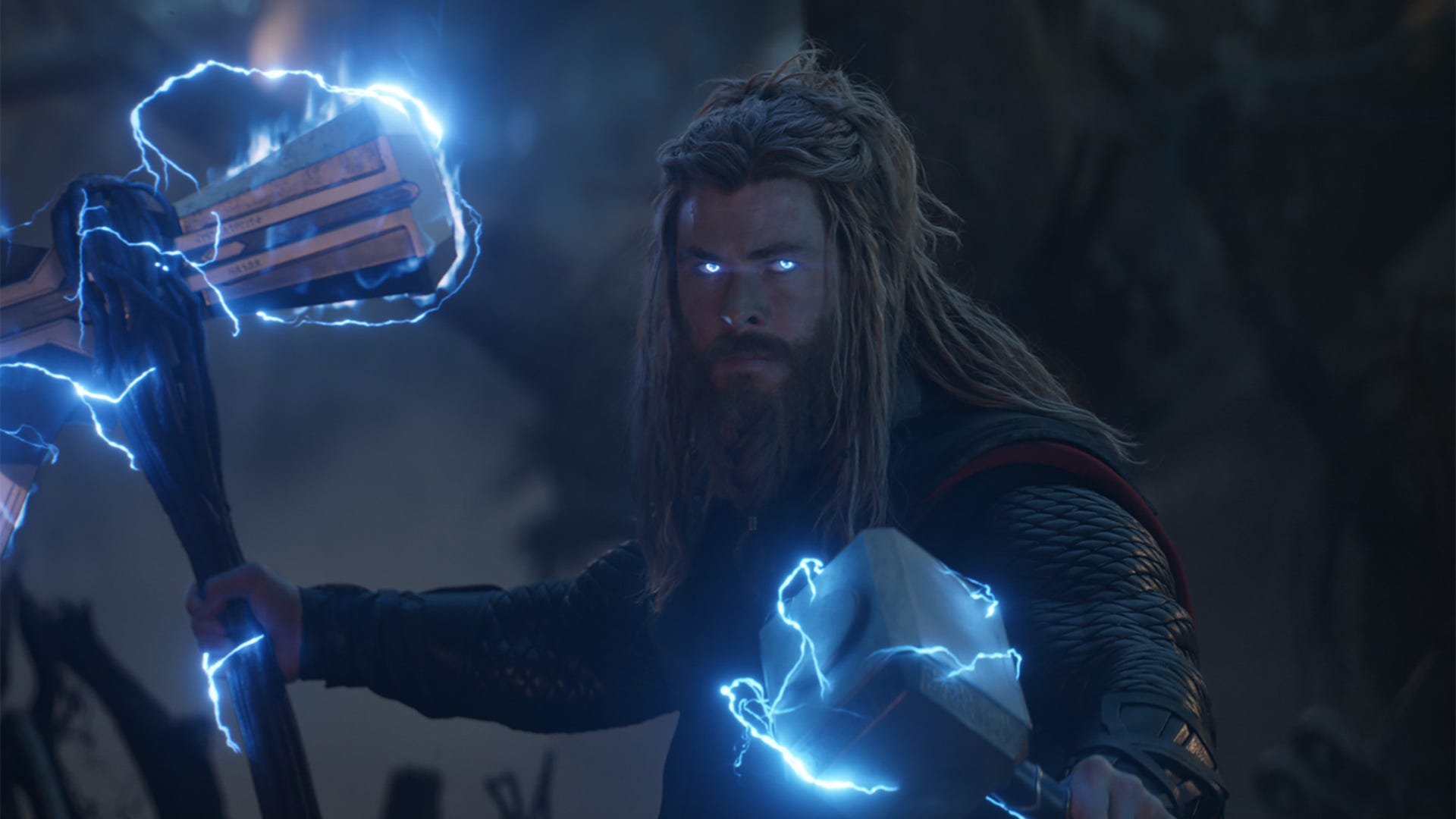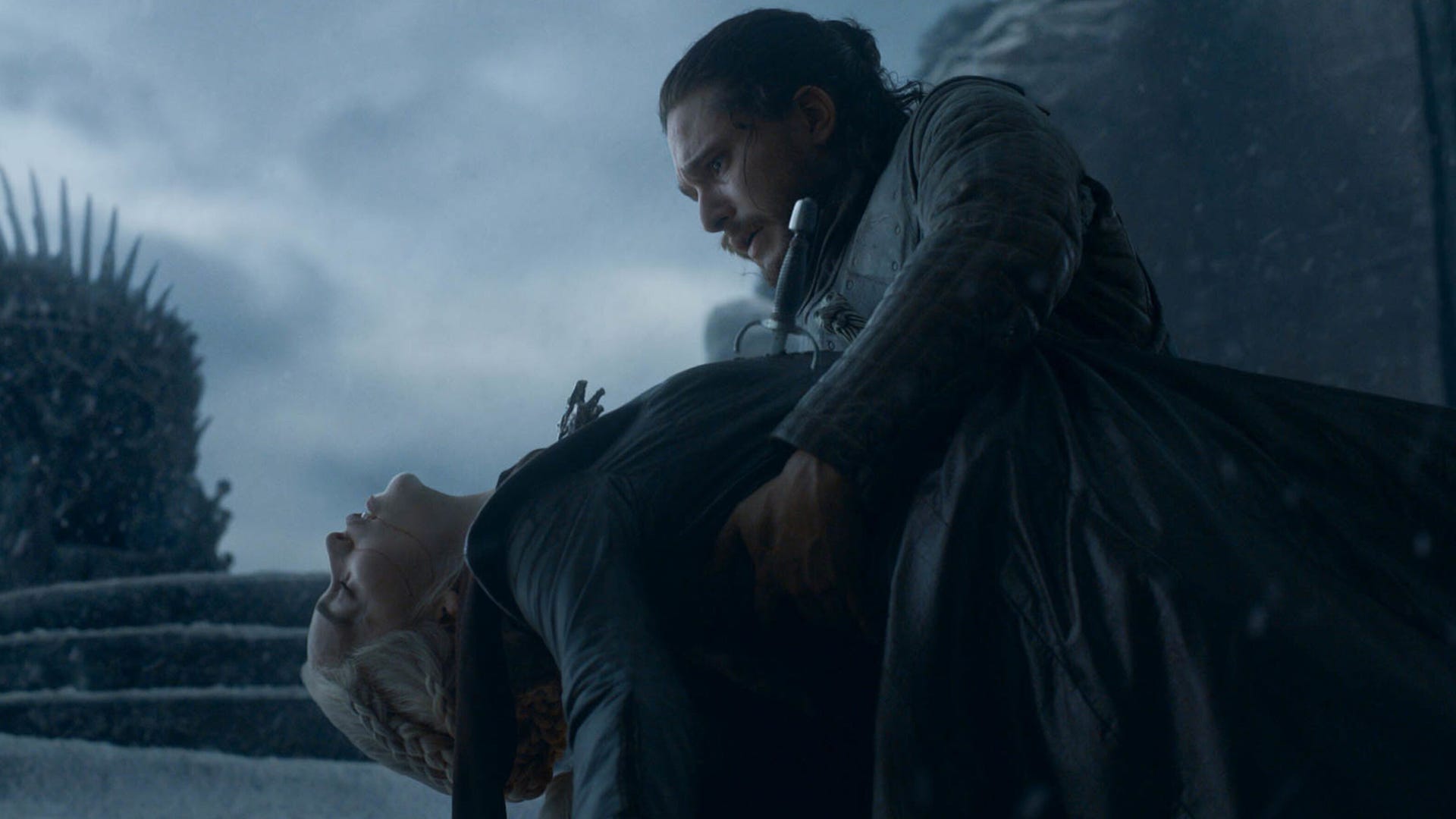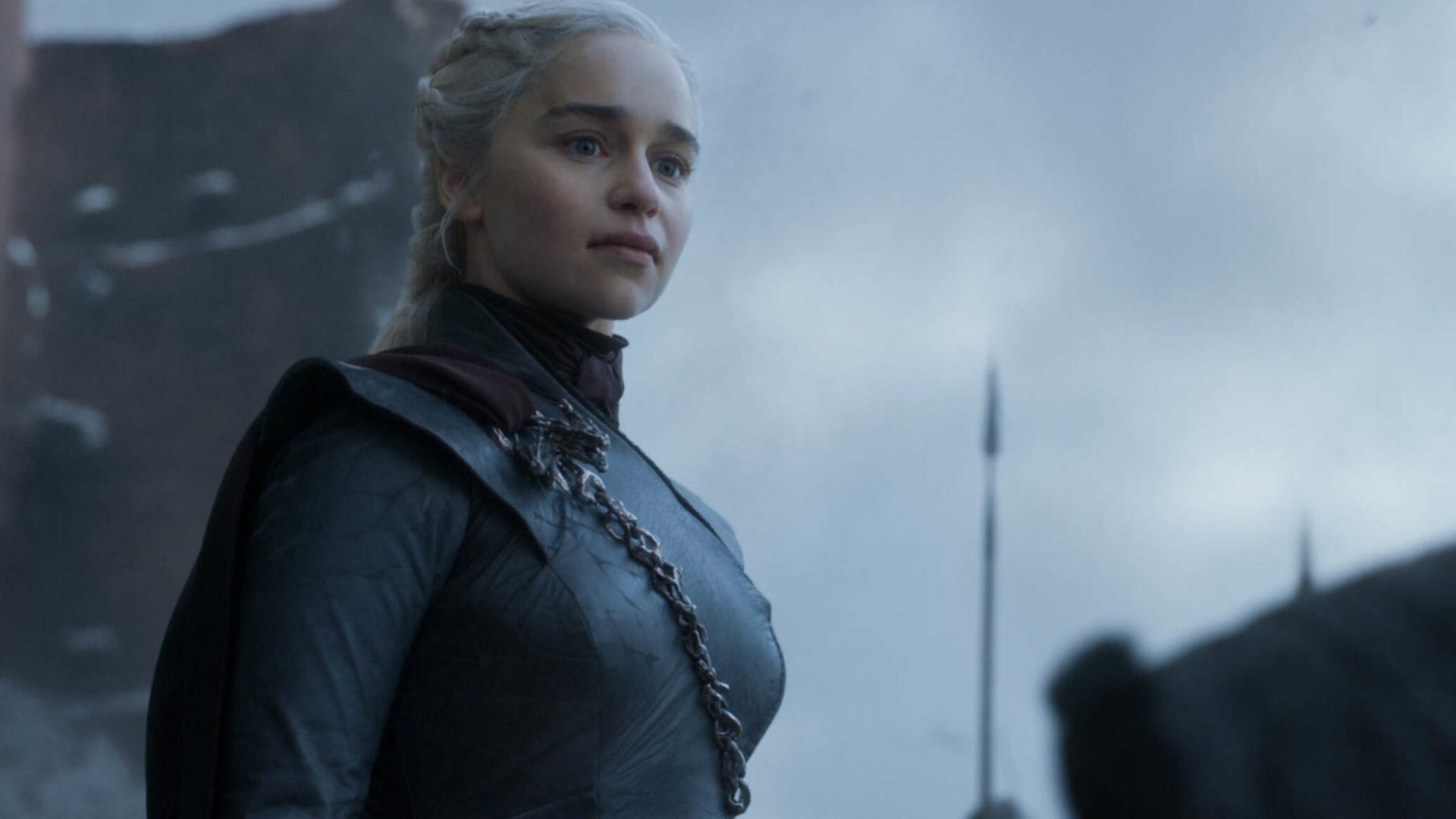Join or Sign In
Sign in to customize your TV listings
By joining TV Guide, you agree to our Terms of Use and acknowledge the data practices in our Privacy Policy.
Game of Thrones Botched Its Ending By Ignoring the Lessons of the MCU
When you think about the legacies they leave behind, one is much more positive than the other
This post contains spoilers for Game of Thrones and Avengers: Endgame
In the last month, we've bid a fond farewell to both Sansa Stark (Sophie Turner) and Captain America (Chris Evans). We've said goodbye to both Daenerys Targaryen (Emilia Clarke) and Tony Stark (Robert Downey Jr.). And although it wasn't certain that either would be successful at the outset, HBO's sprawling fantasy series Game of Thrones and the interconnected world of the Marvel Cinematic Universe eventually came to define an era in pop culture, one in which geeky intellectual property left the shadows and was embraced by the mainstream. But when you think about the legacies each franchise now leaves behind, one is much more positive than the other.
In April, Avengers: Endgame concluded a 22-movie saga that spanned more than a decade of storytelling and featured a veritable murderers' row of talent. It revitalized careers and led to the creation of what is now our nation's favorite pastime, debating the bona fides of The Best Chris. (For the record, it's Evans.) Although some viewers may have taken issue with the weakness of a villain like Thanos (Josh Brolin), Steve Rogers' happy ending with Peggy Carter (Hayley Atwell) in the past, or the way everyone in the film reacted to Thor's (Chris Hemsworth) trauma as if it were a joke, Endgame was still an overwhelmingly satisfying end to the Avengers saga.
22 Burning Questions We Have After Avengers: Endgame
After 11 years, the interconnected stories of the many men and women of the MCU culminated in a massive final battle at the ruins of the Avengers compound following a thrilling time heist to secure the Infinity Stones and reverse the effects of Thanos' snap. The highlights of that final battle, which quickly made the rounds on the internet just days after the film's release, included Cap being worthy of wielding Thor's hammer, the emotional arrival of every hero who had been dusted in Infinity War, the reunion between Tony and Peter Parker (Tom Holland), and finally getting to hear Cap utter the words "Avengers assemble!" It was a blockbuster spectacle fitting of a decade-plus of wildly expansive storytelling, and it was an ending that benefited greatly from giving our favorite heroes their moments to shine in order to tap into viewers' emotional connections to the characters. It's likely we'll never see something of this scale again.

Chris Hemsworth, Avengers: Endgame
Marvel StudiosIn 2008, though, when the first Iron Man film debuted in theaters, there was no guarantee of its success. The MCU was a major gamble for Marvel, but it steadily grew stronger with each movie and the world it created grew larger until it seemed, at times, to be all-consuming. Game of Thrones followed a similarly slow and methodical rise to the top of the pop culture zeitgeist after debuting on HBO in 2011. It wasn't a worldwide phenomenon right out of the gate, but shocking turns like Ned Stark's (Sean Bean) beheading in Season 1 and the bloody events of the Red Wedding in Season 3 helped launch the series into water-cooler territory. And it has remained there ever since.
Now, much was written prior to the start of the final season about how Game of Thrones was the last television series we would collectively watch together. That may or may not turn out to be true (I would bet on it being the latter), but unlike Avengers: Endgame, the final six-episode season of Game of Thrones was ultimately an unworthy send-off to one of the biggest series in the world.
Game of Thrones Season 8 Finale Complete Coverage
Sunday's series finale, which picked up in the aftermath of Dany's attack on King's Landing in the previous episode, saw Jon Snow (Kit Harington) kill his queen for the greater good while Bran (Isaac Hempstead Wright) was chosen as the new king of the six kingdoms (the North became independent). This would have been a fine, if disappointing, ending had it existed in a vacuum. But it doesn't, and we can't ignore how we got here or the fact showrunners David Benioff and D.B. Weiss rushed through story in Seasons 7 and 8 and deliberately left things off-screen in an attempt to surprise viewers and arrive at this endgame, which is presumably the same ending that will one day occur in George R. R. Martin's A Song of Ice and Fire novels. We also can't ignore that this accelerated pacing and the decision to prioritize shock and spectacle -- key pieces to the show's overall success once upon a time -- over carefully plotted character development, the kind that had been a staple of the series when it still had the novels to act as a guide, has ultimately tarnished the show's legacy.

Kit Harington and Emilia Clarke, Game of Thrones
HBOSure, "The Iron Throne" might actually be a fitting ending to the story of Westeros, albeit one with a mixed message about power and its ability to corrupt. And yes, you can find things in the finale to be happy about, like Sansa becoming the Queen of the North, Brienne (Gwendoline Christie) assuming the role of Lord Commander of the Kingsguard and filling in Jaime's (Nikolaj Coster-Waldau) page in the Kingsguard book, and Jon reuniting with Ghost at the Wall. But a fitting end can still be a disappointing one, especially when it threatens to retroactively affect how viewers feel about the rest of the series.
As it stands, we were cheated out of a major chunk of the story. We didn't get to see Daenerys' descent into madness (foreshadowing it is not the same thing), which could have been a rich and rewarding arc for her character and for Clarke as an actress. We spent very little time with Bran over the last few seasons, so it was difficult to muster up any feelings about him ending up as the ruler of the six kingdoms. We didn't even get to spend time with Jon to see how he processed the truth of his parentage, which was dropped on him like an anvil in the Season 8 premiere. And if all of that wasn't enough, Sansa was frequently reduced to playing the role of mean girl and Arya's (Maisie William) arc, the high point of which was her killing the Night King in "The Long Night," disintegrated as the series approached its end.
In previous seasons the show would have spent time developing all of these storylines so these developments didn't threaten to destroy characters or give us whiplash. But even though the Iron Throne is no more and the rules of politics in Westeros have been somewhat rewritten, none of it feels particularly earned. And this is what we will remember when we think of Game of Thrones in the years to come. We won't remember how it developed a rich and sprawling world to great effect. We won't remember the depth of the story or the nuance of characters like Cersei (Lena Headey). We won't remember the bold storytelling that once defined it. We will remember the ways in which the writers failed these characters, their story, and ultimately the audience.
I Only Watched Game of Thrones' Final Season and Can Confirm It Was Bad
Expectations obviously play a large role in determining what makes a satisfying conclusion, and it's impossible to satisfy everyone, especially when fans are as invested in the outcome as they were here. But when you compare how Kevin Feige and Marvel Studios concluded a 22-film arc with an emotionally resonant finale that respected the characters as well as their fans, and the way Benioff and Weiss seemingly stumbled toward their own endgame less than a month later, often ignoring the complex characters who once populated this world (and the people who've spent the last eight years following them), it's clear there is a right way and a wrong way to go about it.
Both the MCU and Game of Thrones had to wrap up their sprawling stories in a finite amount of time. Both came with a built-in fandom with their own expectations of how it should be done. And both projects grew exponentially over the course of their runs as new fans came onboard and their popularity skyrocketed. However, at the end of the day, only one of the two respected the story and the fandom enough to spend the time and effort necessary to deliver on its final act. And that's ultimately what we're going to remember in the end when we look back at this period in pop culture history.
Need HBO? Add it through Hulu or through Amazon

Daenerys Targaryen (Emilia Clarke) on Game of Thrones Season 8, Episode 6: "The Iron Throne"
HBO/Helen Sloan